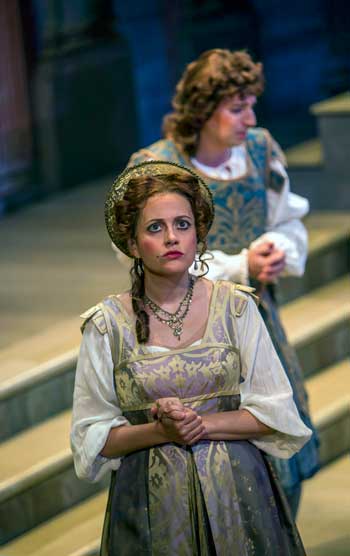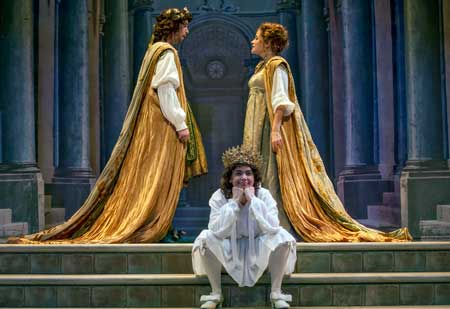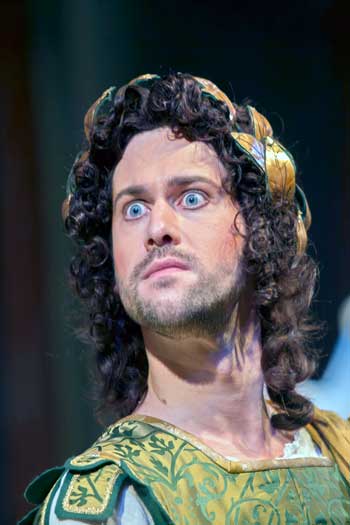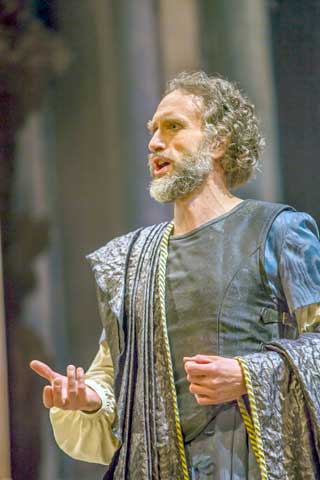Opera (1643)
L’incoronazione di Poppea (The Coronation of Poppea)
by Claudio Monteverdi
Libretto by Giovanni Francesco Busenello
Paul O’Dette and Stephen Stubbs, Musical Directors
Gilbert Blin, Stage Director; Robert Mealy, Concertmaster
Anna Watkins, Costume Designer; Gilbert Blin, Set Designer; Lenore Doxsee, Lighting Designer
Boston Early Music Festival
Poppea:
Boston University Theatre, Boston
June 9, 2015 at 7pm
June 14, 2015 at 3:30pm
Festival:
Various locations around Boston
June 7-14, 2015
With Amanda Forsythe (Poppea), David Hansen (Nerone), Christian Immler (Seneca), Shannon Mercer (Ottavia), Nathan Medley (Ottone), Nell Snaidas (Amore, Valletto), John Taylor Ward (Merurio), Teres Watkim (Drusilla), Jose Lemos (Nutrice), Laura Pudwell (Arnalta), Erica Schuller (La Fortuna, Damigella), Danielle Reutter-Harrah (La Virtu, Pallade), Aaron Sheehan (Liberto), Marco Bussi (Littore)

Nathan Medley as Ottone
in “Poppea”
Photo: Frank Siteman
Courtesy of Boston Early Music Festival
Nero, as we all know, was something of an asshole, and this extremely fun and entertaining performance of Monteverdi’s great opera, bears that out while also, miraculously, enabling him, in some capacity, as a romantic lead. The libretto is somewhat Shakespearean in its knots and complexities.
Nerone (aka Nero, David Hansen) is married to Ottavia (Shannon Mercer), whom he can’t stand. He is in love with Poppea (Amanda Forsythe), who’s beautiful and gives him the TLC he can’t seem to get with Ottavia.
The goddesses Fortuna (Erica Schuller), Virtue (Danielle Reuter-Harrah) and Amore (Nell Snaidas) are at work behind the scenes, and Amore seems to have the edge in this situation, hoping to prevail on the side of love. On the terrestrial plane, the philosopher Seneca tries to preach virtue to the love-sodden and self-involved emperor, who wants to hear nothing of it. In fact, he wants to hear so little of it, he orders Seneca to be killed off.

Nell Snaidas as Amore
Amanda Forsythe as Poppea
in “Poppea”
Photo: Frank Siteman
Courtesy of Boston Early Music Festival
Meanwhile, other machinations are developing.
Ottone (Nathan Medley). who’s in love with Poppea who won’t, in turn, look at him, is enlisted and blackmailed by Queen Ottavia, who insists that he kills Poppea off to rid her of the challenge to Nero’s love, otherwise she’ll lie to Nero that Ottone raped her. Drusilla (Teresa Wakim) loves Ottone and offers him her clothes as a disguise when he goes to assassinate Poppea, but Poppea wakes before Ottone can do his dirty work.
Things do work out in the end though. Drusilla is exiled and Ottone goes with her, happily. Ottavia, whose evil intentions against Poppea come out is also banished, and Nerone gets to marry Poppea.
What a great libretto (thanks to Giovanni Francesco Busenello) this is, full of all sorts of crazy machinations, and what a great job Boston Early Music Festival has done in performing this work in a way which makes it entirely enjoyable.
The playing and singing are first rate. The abundance of good voices in this production is striking, and the acting talent that goes along with those voices is also prodigious. Extremely witty and interesting stage direction contributes to the vigor of the performance, making its not insignficant three hours and forty minutes an unremitting pleasure.
Though every singer in this production is worthy of note, there are several that are particularly striking.

in “Poppea”
Photo: Frank Siteman
Courtesy of Boston Early Music Festival
David Hansen, as Nerone, is a countertenor with a brilliantly dramatic manner that here not only produces riveting undulations of tone, but also an appropriately irritating quality as the self-absorbed and half-demented emperor. That the performance brings that out while still somehow enabling Nerone as a kind of romantic lead is quite a feat.
Amanda Forsythe, as Poppea, has a rich voice and a wonderfully passionate stage presence.
Nell Snaidas, as Amore and Valletto, is not only a great singer, but a great comic actress, adding a Puck-like presence to the production, making the scenes in which she appears sparkle.

in “Poppea”
Photo: Frank Siteman
Courtesy of Boston Early Music Festival
Christian Immler, as Seneca, has a warm baritone and a gravitas well suited to the role.
The careful execution of the intricate embellishments in singing throughout the performance make the experience most satisfying.
The small orchestra, which plays face to face and with concertmaster as conductor, is precise and masterful in executing the long and demanding score.
Monteverdi’s tonal genius is in evidence throughout, in the sometimes bent tonalities that sound temporarily off-key. Players and singers do their jobs with such clarity that these moments stand out with full distinctiveness of Monteverdi’s vision, enabling one to hear very specifically how musically courageous he can be, often challenging the boundaries of the ornate and heavily structured forms which shape the contours of his music.
The Lowdown: If, from the outside of the quite vibrant early music world, you thought Monteverdi was boring, think again. This fabulous production is not only musically brilliant, but dramatically satisfying and lots of fun. Try to catch this, or one of the other two Monteverdi operas (Ulisse, Orfeo) being performed as part of the Boston Early Music Festival this week.
– BADMan
Leave a Reply